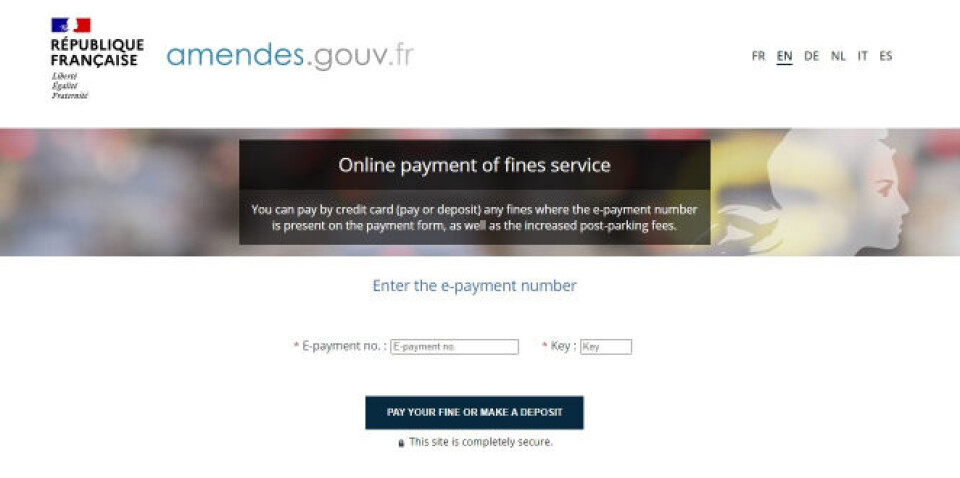-
Many parcel collection points in France are overwhelmed as Christmas approaches
Heavy customer traffic leaves some struggling to cope
-
Warnings issued over connecting to public WiFi networks in France
Lack of encryption and risk of connecting to ‘fake networks’ leave users at risk of hacking attempts
-
Provence’s santon makers seek geographical protection for historic craft
The small, hand-painted clay figurines are at the heart of traditional French Christmas nativity scenes
Scam alert in France: ‘Unpaid driving fine’ SMS with fake link
A phishing scam that asks for payment details via a convincing (but fake) website is on the rise. Here’s how to avoid falling victim
A new scam about ‘unpaid parking fines’ is circulating via SMS in France, targeting millions of drivers with links to websites that appear genuine, but are actually aiming to steal your money.
Many drivers may be fooled by these messages, especially as 11 million genuine fines were issued to drivers in 2021. Unpaid parking is the second cause of driving fines in France, show figures from the Observatoire national interministériel de la Sécurité routière (ONISR).
This makes the scam appear particularly believable.
Drivers receive a text message reminding them about an unpaid fine. The message and link appear to come from the ANTAI (l’Agence nationale de traitement automatisé des infractions), which is the authority that manages driving fines.
However, ANTAI has warned that these messages are fake, and that they are increasing in number.
It said that it would only ever send a payment SMS at the time of a fine being issued, and never as a reminder. It also said that only one website link, amendes.gouv.fr, was the genuine payment site.
It stated: “The only SMSs sent about fines are about immediate payment during an interaction with law enforcement agents on the ground [at the time of the offence].”
How can I recognise a genuine or fake fine SMS?
ANTAI said that:
-
You will only receive an SMS about payment in the presence of the law enforcement officer issuing the fine
-
A payment link received by SMS will point to the website www.amendes.gouv.fr only
-
You can also download the amendes.gouv app on your smartphone from the Apple or Google Play store, which is another secure way to pay genuine fines
The only genuine payment reminders sent by ANTAI are by post, not by SMS.

This is the only genuine fine-paying website in France, available in French, English, and four other languages. Image: Screenshot / amendes.gouv.fr
Similar SMS and website scams
The fine payment scam is far from the only fraud circulating via SMS in France. This process, whereby the recipient receives an SMS with a link to a website that appears genuine (but is, in fact, a scam), is called “phishing”.
Some of the websites can appear very convincing, with the correct logo, colours, and fonts. Even the website addresses may appear very similar to the genuine URL.
The best thing to do in these situations is to:
-
Never click on a link sent in a text message
-
Instead, navigate to the website manually, and check the URL
-
Do not enter your payment details on a website sent by SMS
-
If in doubt, do not click or fill in any forms, and contact the authority or agency first
-
If you think you have fallen victim to a scam, call your bank, and report it to signal-arnaques.com
A Connexion reader wrote to us to explain how he and his wife were nearly caught out by a similar phishing scam, which asked them to renew their cartes Vitales.
He received a text with a link, which took him to a “very professional website” that looked like the Ameli Assurance Maladie site. He filled in the form, which asked for his bank details to pay for the carte postage.
He and his wife only suspected a scam when she received a call asking for her to go on to the couple’s banking website to approve the payment. She then “smelt a rat and rang the bank, who blocked the card”, he said.
This is a common scam that has been reported increasingly since 2019.
Assurance Maladie will never ask for your medical or bank details by message, and you do not have to renew a carte Vitale by text. Instead, the process is usually done in person in pharmacies.
Related articles
Warning over new scam on French carte Vitale healthcare cards
Carte Vitale scam: People in France warned over fake emails and texts
Carte Vitale, heating engineer: beware of these scams in France
























